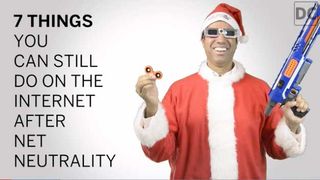Public Knowledge: Not Clear Pai Video Rates Fair Use Exception

Public Knowledge, which often weighs in on issues of fair use, has some thoughts about pushback from copyright holders on FCC Chairman Ajit Pai's Daily Caller video sending up the doomsday rhetoric about the impact of his network neutrality rollback proposal--now approved order.
Pai is known for his sense of humor, including at meetings and online-he once read some mean tweets directed his way, but is an acquired taste yet to be acquired by the many in the seriously unhappy net neutrality activist camp, which includes Public Knowledge.
The Pai video is hardly a slam dunk fair use use, suggestsMeredith Rose, Public Knowledge policy council. She said that while the Pai video is something she thinks actually ought to be protected by fair use, it is no slam dunk given current copyright law. "Copyright winds up being the hammer that makes everybody look like a nail, she said.
The video used music clips, including from Star Wars, as Pai demonstrated things folks could still do on the Internet after what he billed as the Obama-era regs were repealed, including posting puppy photos, shopping for presents online, binge-watching favorite shows, or keeping up with your fan community--in this case Star Wars cosplay.
Star Wars star Mark Hammill had tweeted whether Pai had paid composer John Williams for using the Star Wars theme and, according to the Washington Post, DJ Harry Rodrigues (Pai also used the Harlem Shake), threatened to take legal action. The video was briefly absent from YouTube, according to various reports.
She said the Daily Caller claim that it was a parody was a "pretty uphill fight." Their use of the music from the Harlem Shake, for example. "The legal and colloquial understanding of what a parody is differs." Legally, to get the parody exception from copyright infringement, she said, "you have to actually use the copyrighted material to make fun of that same copyrighted material," and so it is almost certainly doesn't warrant parody protection [in the legal sense].
Rose said the use of John Williams music may very well be fair use, but she said those calls are very fact-specific and even judge-specific, so "sometimes you don't know what is fair use until you litigate it."
Broadcasting & Cable Newsletter
The smarter way to stay on top of broadcasting and cable industry. Sign up below
She said copyright law was not conceived of in a world of derivative creations and memes. "So you have the difference between memes that go on the Internet, which are by definition self-propagating and outside of the control of the author, and copyright, which presupposes authorial control over distribution."
She says this [Pai] might be the kind of thing we want to protect, but that it is not clear that it is protected fair use under the law as it currently stands.
She suggests that could be a fair use teaching moment. "It is a weird moment when that disconnect is really visible and I hope it sparks a more extensive conversation about it. In an ideal world this would be a pretty open and shut fair use case. I don't think it is that clear cut."
So, sounds like a moment for Public Knowledge to weigh in on that point. It may still, Rose suggested.
As to YouTube pulling the video briefly, she pointed out, that was required if a copyright holder provides such a takedown notice, and that nobody had to fight "Big Bad Google" [YouTube's parent] to restore it, as was the case.
Contributing editor John Eggerton has been an editor and/or writer on media regulation, legislation and policy for over four decades, including covering the FCC, FTC, Congress, the major media trade associations, and the federal courts. In addition to Multichannel News and Broadcasting + Cable, his work has appeared in Radio World, TV Technology, TV Fax, This Week in Consumer Electronics, Variety and the Encyclopedia Britannica.

